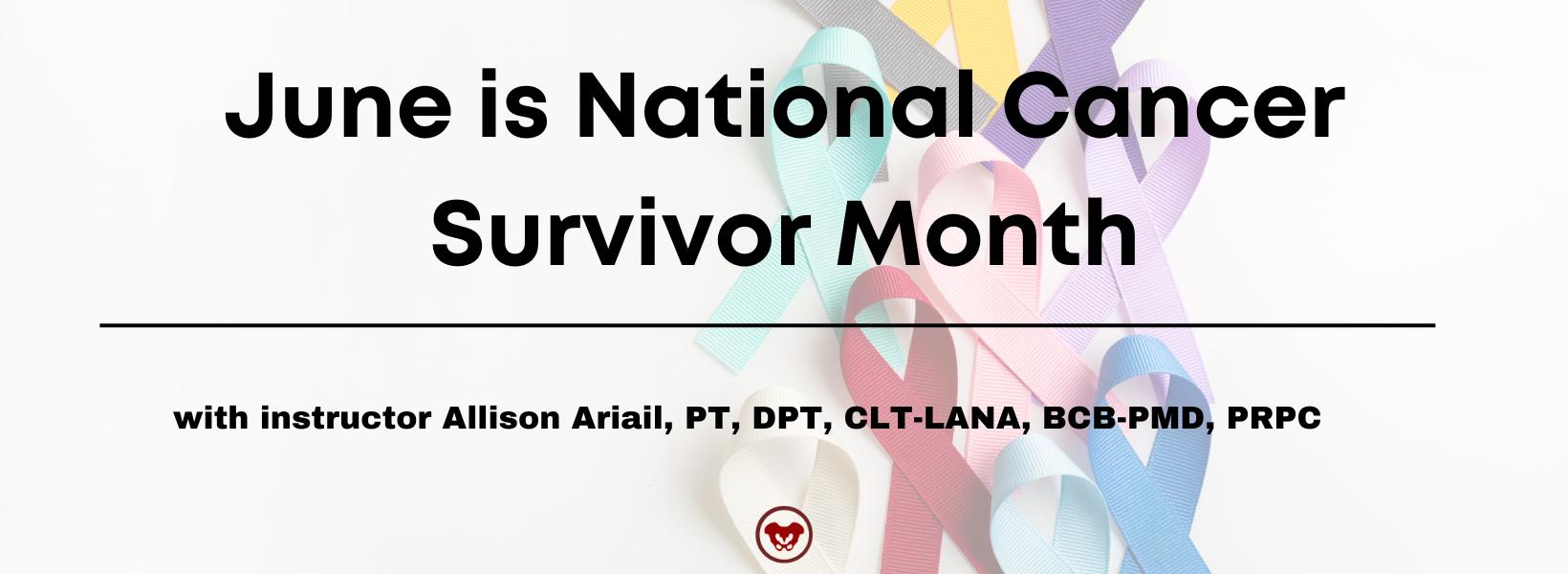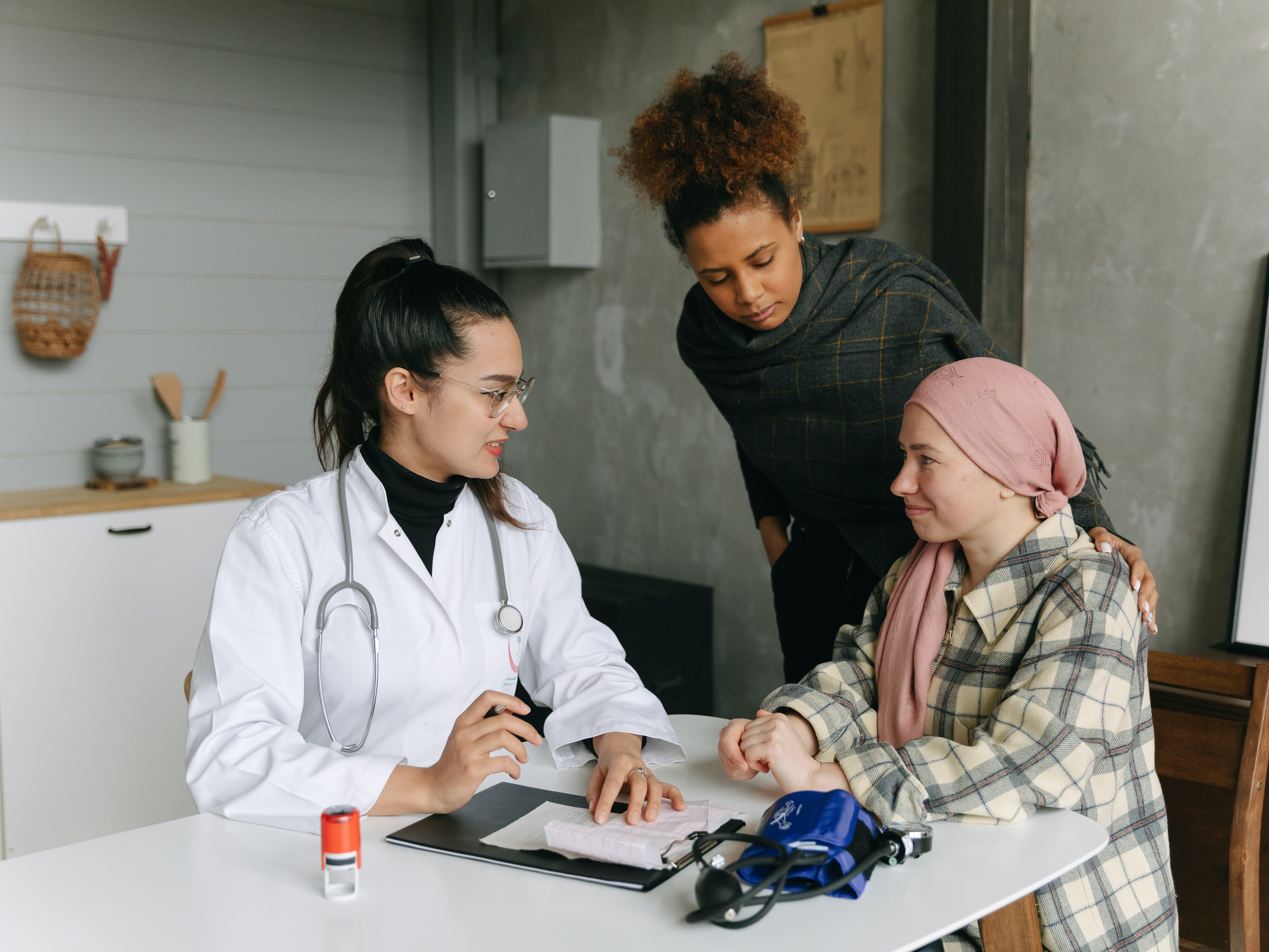June is National Cancer Survivor Month

Allison Ariail, PT, DPT, CLT-LAANA, BCB-PMD is one of the creators of the Herman & Wallace Oncology of the Pelvic Floor Course Series. Allison Ariail is a physical therapist who started working in oncology in 2007 when she became certified as a lymphatic therapist. She worked with breast cancer, lymphedema patients, head and neck cancer patients, and the overall oncology team to work with the whole patient to help them get better. When writing these courses, Allison was part of a knowledgeable team that included Amy Sides and Nicole Dugan among others.
June is National Cancer Survivor Month. When individuals talk about “survivorship,” they are referring to the process of navigating their life experiences and the difficulties that they have as a result of their cancer diagnosis. Survivorship begins at the time of diagnosis and includes those individuals that are undergoing treatment, those after treatment with no signs of cancer, those undergoing extended treatment to control the cancer, those undergoing extended treatment to reduce the risk of the return of cancer, and those individuals with advanced cancer. According to cancer.net, there were 18 million people in the United States living with a history of cancer.1 Considering the number of people surviving cancer, and the degree of medical treatment can vary for each of them, there will be a wide range of needs from cancer survivors. Rehabilitation professionals are in a unique position where we can help patients in many different ways to help improve their function, ability to participate in activities that they enjoy and improve their quality of life.
There are multiple studies that show how rehabilitation can help cancer survivors. The research varies in its focus; it could be examining specific side effects such as chemotherapy-induced peripheral neuropathy, looking at the effects of fatigue after treatment, or to sexual health after cancer diagnoses. In January of this year, a study came out that showed a physical rehabilitation program of moderate intensity promoted a relief of general and physical fatigue.2 This is huge for cancer patients! Fatigue is an immense problem that survivors suffer from. Another study from 2019 showed that a 12-week exercise-based training program can negate some of the deficits that occur in strength and physical function that occur from the medical treatment of cancer.3 The exercise program, which included both aerobic and resistance training, helped both middle-aged and older adults improve their physical function and strength. In 2018 Dennet et al performed a qualitative study of cancer survivors’ experiences of an exercise-based rehabilitation program. They determined that an exercise-based cancer rehabilitation program was important in facilitating a ‘return to normal’ and helped patients increase their ability to participate in physical activities.4
We as clinicians should embrace this research and work to get these patients referred to us for rehab! As we can see from the above research, this is a population that could greatly use rehabilitation, yet they may not be getting the referrals they need. In 2022, Thorsen et al surveyed almost 1000 young adult survivors. They found that a large proportion of long-term young adult cancer survivors report needing information about lifestyle and rehabilitation more than a decade after they completed their treatment.5 Let’s get these and other aged survivors in for treatment so we can help them feel better and get back to living their lives! Working with oncology patients can be very rewarding. When asked how therapy has influenced her, one patient responded “My PT has played a significant role in my recovery from surgery and the side effects of cancer treatment. She pays attention to and treats ‘the little things’ that are often forgotten about but yet have the biggest impact on my quality of life. She is there helping me long after my other doctors are done treating me.”
Herman & Wallace offers an Oncology Series that can help you gain the knowledge and skills to be able to help these patients. In Oncology of the Pelvic Floor Level 1, we cover general oncology. In this course, we learn about cancer treatment, short-term side effects, and long-term side effects, and learn rehab techniques to help these patients. In Oncology of the Pelvic Floor Level 2A and Oncology of the Pelvic Floor Level 2B we go more in-depth with pelvic-related cancers. In Level 2A we cover topics related to testicular cancer, prostate cancer, penile cancer, and colorectal cancers while in Level 2B we cover topics related to gynecological cancers and bladder cancer. In both courses, you learn hands-on treatment techniques to help patients recover function, and feel better. Please join us by taking this series to be able to help these patients!
Resources:
- What is cancer survivorship? Cancer.net. 7/2021 https://www.cancer.net/survivorship/what-cancer-survivorship
- Penna GB, Otto DM, D Silva T, et al. Physical rehabilitation for the management of cancer-related fatigue during cytotoxic treatment” a systemic review with meta-analysis. Support Care Cancer 31 (2023). https://doi.org/10.1007/s00520-022-07549-7
- Dittus K, Toth M, Priest J, et al. Effects of an exercise-based oncology rehabilitation program and age on strength and physical function in cancer survivors. Support Care Cancer 28, 3747-3754 (2020). https://doi.org/10.1007/s00520-019-05163-8
- Dennett AM, Peiris CL, Taylor NF, et al. “A good stepping stone to normality’: a qualitative study of cancer survivors’ experiences of an exercise-based rehabilitation program. Support Care Cancer 27, 1729-1736. (2019). https://doi.org/10.1007/s00520-018-4429-1
- Thorsen L, Bohn SK.H, Lie HC, et al. Needs for information about lifestyle and rehabilitation in long-term young adult cancer survivors. Support Care Cancer. 30, 521-533 (2022). https://doi.org/10.1007/s00520-021-06418-z

*Certified Lymphatic Therapists may skip Oncology of the Pelvic Floor Level 1 and move on to the Level 2A and Level 2B courses.*
Oncology of the Pelvic Floor Level 1
No partner needed for registration
Price: $550.00 Experience Level: Beginner Contact Hours: 17.5 hours
Description: The course will address issues that are commonly seen in a patient who has been diagnosed with cancer such as cardiotoxicity, peripheral neuropathy, and radiation fibrosis. Some holistic medicine topics, including yoga and mindfulness, will be discussed in order to fully prepare the participant to be able to competently work with cancer survivors.
The basics of the lymphatic system will be covered, as well as when to refer the patient to a lymphatic specialist for further treatment. Red flags and warning symptoms will be discussed so the participant feels comfortable with knowing when to refer the patient back to their medical provider for further assessment.
This introductory course is aimed to get the participant comfortable with working with oncology patients and as part of an interdisciplinary oncology team.
Course Dates: July 8-9 and December 2-3
Oncology of the Pelvic Floor Level 2A
Participants MUST register with a partner, or plan to have a volunteer available to work on during course labs.
Price: $495.00 Experience Level: Intermediate Contact Hours: 17.25 hours
This course was designed to build on the information that was presented in Oncology of the Pelvic Floor Level 1.
Description: Information will be provided focusing on male pelvic cancers, colorectal cancer, and anal cancer including risk factors, diagnosis, and prognosis. The participant will also understand the sequelae of the medical treatment of cancer and how this can impact a patient’s body and quality of life. Other topics will include rehabilitation and nutritional aspects focusing on these specific cancers, as well as home program options that patients can implement as an adjunct to therapy.
Course Dates: September 23-24
Oncology of the Pelvic Floor Level 2B
Participants MUST register with a partner, or plan to have a volunteer available to work on during course labs.
Price: $600.00 Experience Level: Intermediate Contact Hours: 19.25 hours
This course was designed to build on the information that was presented in Oncology of the Pelvic Floor Level 1.
Description: Information will be provided focusing on gynecological and bladder cancers including risk factors, diagnosis, and prognosis. The participant will also understand the sequelae of the medical treatment of cancer and how this can impact a patient’s body and quality of life. Other topics include rehabilitation and nutritional aspects focusing on these specific cancers, as well as home program options that patients can implement as an adjunct to therapy.
Course Dates: December 9-10
By accepting you will be accessing a service provided by a third-party external to https://hermanwallace.com/





































